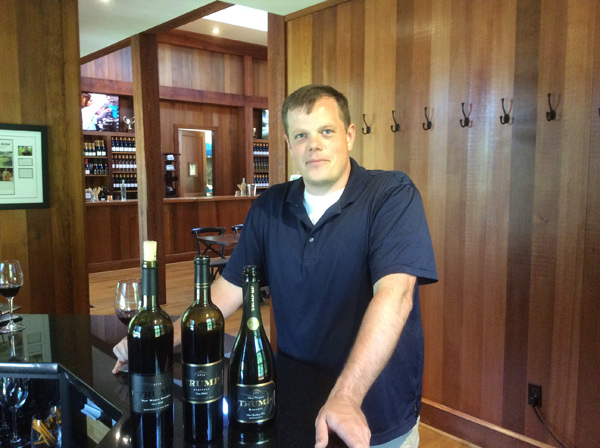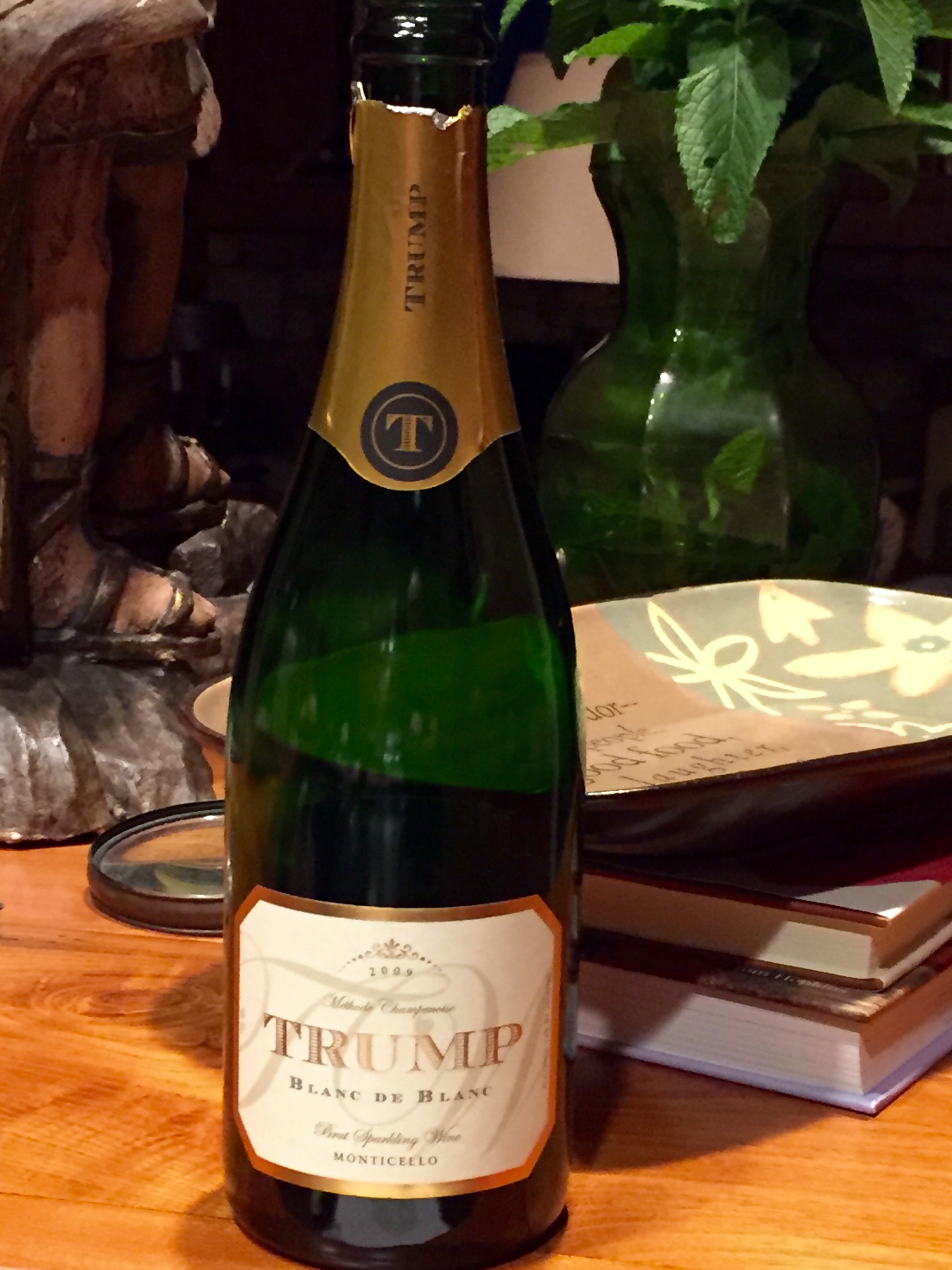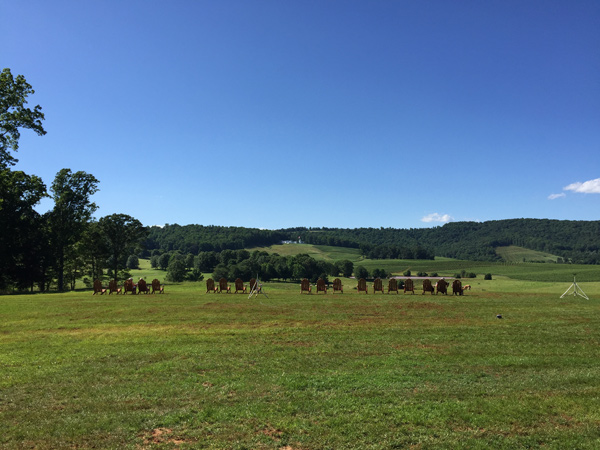Trump Winery: Sometimes a Wine is Just a Wine

If presidential hopeful Donald Trump wins the November election, he certainly has plenty of personal stocks of sparkling wine to celebrate. His family’s Trump Vineyards in Virginia makes quality bubbly as well as some enjoyable red and white wines.
With 195 acres under vine (all vinifera), Trump has one of the biggest wineries on the East Coast of the U.S., whose 1,000-odd estates are essentially artisanal. You could call this one artisanal too. The wines are all estate grown. Harvesting is by hand, and, as nearly everywhere in Virginia, green harvests and lots of canopy control are vital. The crowded, no-frills production area shouts “purpose-driven.” Production today is a little over 40,000 cases and is set to grow as planting becomes denser, grape sales stop, and up to 30 more acres are added to vine.
To get the obvious out of the way, Eric Trump is CEO of Trump Winery. The estate was acquired in 2011 at a fire-sale price when predecessor Kluge Estates, a bold venture that succumbed to business realities, was auctioned. Of course, American culture has a unique tolerance for failure, which is often how success starts.

The wines are well-crafted and food-friendly—generally good, some very good. Cooperage, for the sparkling wines and Bordeaux blends, is all French. The wines are priced fairly, and tend to have broad appeal. I’ve served some of the merlot blends and traditional method sparkling wines at dinners. Friends who intellectualize wine may pick, but those who just like wine enjoyed them a lot—even over similar bottlings from neighboring estates I served at the same time. The style is more Old World than New World, a straightforward Virginian nod to climate and terroir over alchemy. Sales have doubled since last year, as production and quality rose and older sparkling stocks were depleted—and are now about evenly divided between on-site retail and distribution.
The winery, in the Monticello AVA, sits in some of the most beautiful and gracious countryside in Virginia, a stone’s throw from Jefferson’s Monticello and Monroe’s Highland. The largely south-facing vineyards range from about 600-1,200 feet in elevation. The entrance is marked by a relatively discreet sign saying simply “Trump Winery—Charlottesville, Virginia.” Well-known French consulting enologist Michel Roland helped pick the clones and vineyard sites on the 1,200-acre property in the late ‘90s.

Winemaker Jonathan Wheeler, from the Finger Lakes region of New York, has wide latitude when it comes to the wines. Shaped by experiences too in California and New Zealand, the personable and focused pro has a special interest in the estate’s pinot/chardonnay sparkling range (12,000 cases a year and growing). He started at Kluge in 2006 as assistant winemaker and quickly took charge of the sparkling wine program in 2008. Today he is in charge of the full portfolio of wines.
Chardonnay, in particular, is a tough wine to make great in Virginia, where the summers can be long and muggy. Really, nobody does, apart from some occasional (wonderful) blips in the northern Shenandoah Valley. Trump’s still chardonnay is one of their less interesting wines—no flaws, no flab, no malo, but still pretty basic. They sell a lot of it, of course. But things get more interesting with the all-vintage blanc de blanc and other sparklers. For those, said Wheeler when we met the other day, “…we have to be very careful timing the chardonnay harvest; there is a narrow window when we have both the acid and the ripeness we need.”

Trump’s crisp sparklings are vinified in a combination of tank and barrel, and have prolonged contact with the lees (at least three years, over five for reserves) before disgorging. On offer now in the smallish, charming bungalow-style tasting building are the rich 2009 blanc de blanc, the fine and mature tasting 2008 reserve blanc de blanc and a lively 2010 sparkling rosé (five percent pinot). Production of the latter was 1,500 cases, which will grow to 4,000 for the 2015 vintage (to be released in 2020). They are all pleasing to drink. It’s worth noting the current releases are all from wines made under Wheeler’s eye during the final throes of Kluge Estates.
Virginia’s best producers make nice meritage, which is becoming emblematic of the state’s capacity for fine wine. Trump grows a lot of merlot, cabernet sauvignon, cab franc, malbec, and petit verdot that find their way into a medium body meritage and a fuller “New World Reserve”. Both are respectable—fruit-forward but not jammy—bright and balanced. The soon-to-be-released 2014 reserve is a pretty wine, notably better and more complex than the 2013, and feels like it will evolve into one of their best so far.
Other whites include a crisp and citrusy sauvignon blanc (also challenging in Virginia, but 2015 was a great year for whites) and a viognier with the beautiful aromatic profiles that frequently make this variety really interesting in Virginia.

Looking forward, Wheeler and his team’s skill, and the estate’s drive to raise quality (including denser planting), seem to be setting the stage for better and better wines from Trump. This combo is an absolute prerequisite to good wine in Virginia’s weather-driven production regions, where vineyard siting and planting have often been more by hunch and happenstance than long experience.
You’ll find three tasting notes below. Look for our full tasting report and ratings of Trump wines in September.
-William McIlhenny, Associate Publisher of JamesSuckling.com
Photos from top to bottom: Vineyard at Trump winery; winemaker Jonathan Wheeler; Trump Blanc de Blanc 2009; Trump Sparkling Rosé 2010; and view from Trump winery estate tasting area.
SP Reserve 2008 Brut Traditional Method
Aromas of pear tart, honey and a little dill that carry over onto the palate. Creamy mouthfeel, fine bubbles, and mature taste with nice acidity that carries it all through to an elegant finish with notes of caramel and nuts. Full and harmonious. Five years plus on lees before degorging; fermented mostly in neutral French oak. 91 points. (550 cases)
Blanc de Blanc 2009 Traditional Method
Very pleasant, with aromas and flavors of pastry dough, some citrus and fennel notes. Light toffee on the medium finish. Overall rich, with a nice structure that complements the intensity of flavor. A good wine—almost extra brut. 90 points. (8,000 cases)
Sparkling Rosé 2010 Traditional Method
Bright salmon color, strawberry and cream aromas, initially restrained, in this 95% chardonnay/5% pinot blend with a brioche palate. Balanced and well made, with a fresh, acid-driven finish. Tasted twice. 88 points.